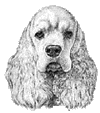 Von Willebrand's Disease
Von Willebrand's Disease
![]()
|
|
|
|
What is Von Willebrand's disease?Von Willebrand's Disease is a common inherited bleeding disorder. Clotting is a complex mechanism. In addition to platelets, clot formation is the result of a long chain of chemical reactions carried out by individual molecules called "clotting factors." Each factor is numbered such that factor I leads to a reaction with factor II forming a new substance. This then reacts with factor III and so on to factor XII. In Von Willebrand's Disease, the dog is missing a substance which helps the platelets form clots and stabilizes Factor VIII in the clotting process. This substance is called "Von Willebrand's factor". Because of the deficient clotting of blood, dogs with Von Willebrand's disease have excessive bleeding upon injury. This would be similar to hemophilia in humans. Certain breeds have a higher incidence of vWD than others. German Shepherds, Doberman Pinschers, Shetland Sheepdogs, Chesapeake Bay Retrievers, German Shorthaired Pointers, Golden Retrievers, Standard Poodles and Scottish Terriers all have a higher than normal incidence, showing that it can be inherited. What are the symptoms?Excessive bleeding is the main symptom. Bleeding generally occurs after a wound or surgery. In these cases, the blood simply does not clot in the normal time, and bleeding is extensive. Dog's with Von Willebrand's disease may also develop nosebleeds, or bleeding from the gums. Bleeding may also occur in the stomach or intestine in which case the stool may either have blood in it, or be black and tarry. Some dogs will have blood in their urine. Bleeding into the joints also occurs, which can cause symptoms similar to those of arthritis. The diagnosis of Von Willebrand's is made through a test which checks for the level of Von Willebrand's factor in the blood. What are the risks?These dogs, without treatment, can bleed to death following surgery, or what might be normally considered less than life threatening injuries. What is the management?Transfusions with blood collected from normal dogs is the only proven way to treat Von Willebrand's disease. Some dogs with Von Willebrand's disease also are hypothyroid - meaning they have lower than normal levels of thyroid hormone. These dogs will benefit from thyroid hormone replacement therapy. Some studies have been done which suggest a drug called desmopressin acetate (DDAVP) may help dogs with a bleeding episode. The drug can be administered intranasally (into the nose) to increase clotting. There is still some controversy over whether this treatment is effective. There is no cure for Von Willebrand's disease. Prevention through eliminating affected individuals from any breeding program is the goal of veterinary medicine today. Tests are available to determine which dogs may have this trait. All individuals with a history of this disorder in their backgrounds should be tested. Race Foster, DVM and Marty Smith,
DVM
|